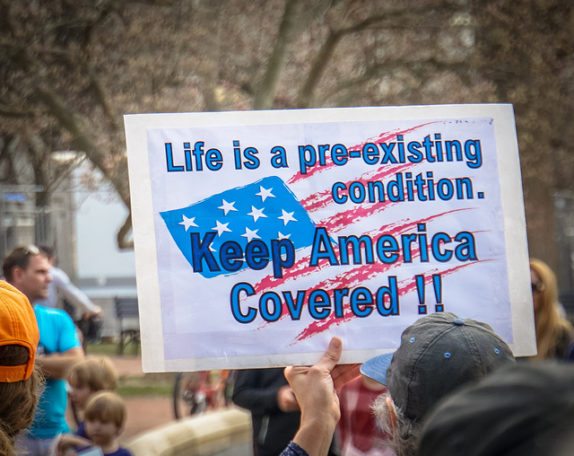
May 6, 2017; NPR, “The Two-Way”
NPQ wants to caution its readers not to assume that elected representatives are harmless just because they’re making a public fact-free spectacle of themselves. In the case of the very serious potential consequences of a repeal-and-replace bill, there is certainly nothing to laugh about for the millions who would be placed at risk. USA Today was pithy in its quoting: “‘We want to brag about the plan,” [President] Trump said amid political fanfare typically reserved for when bills are, you know, signed.”
Even as Trump prematurely celebrated H.R. 1628, the House’s 126-page repeal-and-replace bill, the fundamental elements of which will likely not see the light of day, and while pundits are predicting both that the GOP will be in deep trouble with its constituents if it does pass a bill repealing key provisions of the ACA and that it will be in “catastrophic” trouble if it does not, one man has no doubt who the House bill would benefit. It’s Warren Buffett—the Oracle of Omaha—and others of his monied ilk.
At the annual shareholders meeting for his company, Berkshire Hathaway, billionaire investor/philanthropist Warren Buffett pointed out that if the healthcare repeal bill passed by the House last week had been law last year, “my federal taxes would have gone down 17 percent last year, so it’s a huge tax cut for guys like me.”
The AHCA includes an estimated $600 billion in tax cuts, using the 10-year math associated with federal spending legislation. Almost all of the cuts are related to the passage of the Affordable Care Act (ACA) in 2010. USA Today reports that the cuts and their impact include:
- Eliminating, at cost of $158 billion, the ACA provision that imposed a 3.8% tax on net investment income of individuals earning more than $200,000 and couples more than $250,000
- Repealing the annual fee on health insurance providers, costing $145 billion
- Repealing a 0.9 percent Medicare payroll tax surcharge on wages greater than $200,000 for individuals ($250,000 for couples) at a cost of $117 billion
- Postponing until 2025 a tax on the most generous “Cadillac” health benefit packages due to go into effect in 2020, at a cost of $49 billion
- Reducing from 10 percent to 7.5 percent the threshold for deducting medical expenses from income, at a cost of $35 billion
- Repealing a tax on branded prescription drugs, at a cost of $25 billion
- Repealing a tax on medical devices, at a cost of $19.6 billion
- Repealing a cap of $2,500 on the pre-tax dollars workers could put into flexible spending accounts annually, at a cost of $19 billion
- Increasing, to $6,550 for an individual and $13,100 for couples, the amount that could be put annually into a Health Savings Account, and providing an added bonus for those over 55 years of age, at a cost of $18.6 billion
- Allowing pre-tax dollars in flexible spending and health savings accounts to be spent on over-the-counter drugs, at a cost of $5.5 billion
The law also repeals the 10 percent federal surcharge on fees charged by tanning salons.
Sign up for our free newsletters
Subscribe to NPQ's newsletters to have our top stories delivered directly to your inbox.
By signing up, you agree to our privacy policy and terms of use, and to receive messages from NPQ and our partners.
One tax break targets insurance companies. Prior to the passage of the ACA, a corporation could deduct the first $1 million in compensation paid to an employee. The ACA included a provision specific to insurance companies that limited the deduction to $500,000. Restoring the $1 million deduction limit is estimated to reduce revenues to the federal government by $400 million over the next ten years.
“That is in the law that was passed a couple days ago,” he said. “Anybody with $250,000 a year of adjusted gross income and a lot of investment income is going to have a huge tax cut.”
But he also called the rising cost of healthcare “the tapeworm of American economic competitiveness.”
“If you go back to 1960, or thereabouts, corporate taxes were about 4% of GDP, I mean they bounced around some. And now, they’re about 2% of GDP,” Buffett said during Berkshire Hathaway’s annual shareholders meeting. “At that time, health care was 5% of GDP, and now it’s about 17% of GDP.”
Meanwhile, among the alarmingly out of touch behavior among the House GOP was Republican Rep. Raul Labrador’s response to a constituent in an Idaho town meeting who was asking about Medicare cuts. “Nobody dies because they don’t have access to health care,” he scoffed, to a chorus of boos. The Harvard Medical School found differently in 2009; their study showed that 45,000 people die each year due to a lack of health insurance.—Ruth McCambridge











